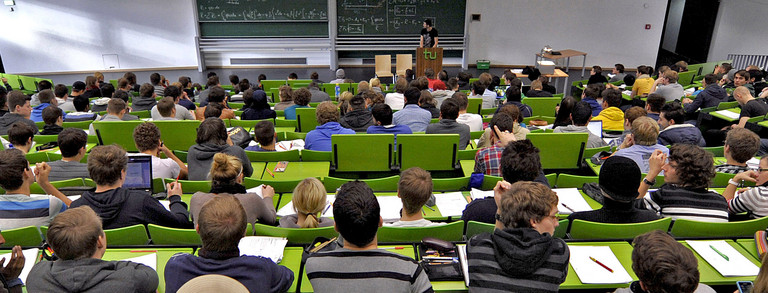Economics & Journalism
Summary
| Degree | Master of Arts (M.A.) |
|---|---|
| Subject group | Social Sciences and Cultural Studies |
| Standard program duration | 4 semesters |
| Admission requirements |
none
|
| Start of studies |
Winter semester
Summer semester |
| Language | German |
| Enrollment requirements | |
| Further information | Website of Institute of Journalism |
| Department | Department of Cultural Studies |
Overview
In addition to the business specialization, for which the wide range of courses offered by the Technical University of Dortmund and the Ruhr University of Bochum is available, students learn techniques of journalistic communication. E&J master’s students are also trained in the Institute of Journalism’s teaching editorial department in the areas of video (TV, online and social media), audio (radio and podcast), digital (online and social media) and writing (print, online and social media). In addition, there are teaching units that are geared to the special needs of this field of work. Collaboration with the Dortmund Center for data-based Media Analysis (DoCMA), where Big Data methods are used to dissect economic policy discourse, also opens up opportunities to participate in research projects.
There is a choice of two study profiles with different entry requirements, which differ in particular with regard to the journalism study unit: The study profile Economics and Economic Policy Journalism is tailor-made for economics bachelor graduates without journalistic traineeship who want to deepen their knowledge of economics and economic policy at the academic master's level and at the same time acquire professional skills in economic policy journalism. The study profile Economic Policy Quality Journalism is aimed in particular at VWL graduates who have already completed a journalistic traineeship.
Skills and knowledge
A prerequisite for enrollment is a Bachelor’s degree in economics with a focus on economics or a comparable degree.
Those wishing to study the profile "Economic Policy Quality Journalism" also need a vocationally qualifying volunteer training.
Field of activity
Graduates of the Economic-policy Quality Journalism profile can later work either as specialized journalists in the field of economic policy or in other areas of macroeconomics where the communication of macroeconomics topics to laypersons plays an important role. This is because the ability to communicate macroeconomics topics in a way that is generally understandable and uses different media channels is very important in many of the traditional professional fields where economists are found. Such professional fields, beyond journalism itself, include above all public relations work for institutions with an economic policy focus, such as public authorities, national and regional governments, associations and organizations, chambers of industry and commerce, economic research institutes, banks, financial institutions and the insurance sector, etc.
The Economic-policy Quality Journalism profile is an ideal springboard for work in the editorial departments of nationwide daily or weekly newspapers and business journals, with political news and business magazines or on the economics and politics desks of public broadcasting companies.




![[Translate to English:] Partner Four hands are holding the green logo of TU Dortmund University](/storages/tu_website/_processed_/1/d/csm_Partner_Nicole_Rechmann_KW_40b35bb3fd.jpg)




![[Translate to English:] Forschung An apparatus with tubes in a laboratory](/storages/tu_website/_processed_/0/c/csm_Forschung_Juergen_Huhn_cbd34afd6d.jpg)
![[Translate to English:] Studium Five students are sitting in a lecture hall. They are talking to each other.](/storages/tu_website/_processed_/c/9/csm_Studium_FelixSchmale_81d94adc86.jpg)





